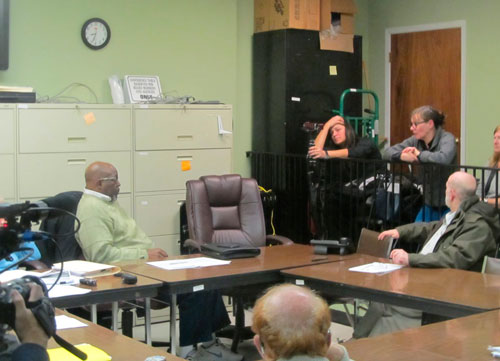In the wake of the murders of George Floyd and Breonna Taylor, legislators are prepared to pass sweeping legislation this week to address police misconduct and lack of discipline.
The Senate Majority and the State Assembly will advance a major policing reforms legislative package, which includes the repeal of 50-A and other important bills to help implement real improvements to law enforcement efforts in New York.
Last year, a public hearing was held to examine the repeal of section 50-A of the Civil Rights Law as part of the Senate Majority’s ongoing commitment to reforming the justice system. The implementation of these policing reforms will help the healing process for minority communities that have been disproportionately targeted and will facilitate better partnerships between law enforcement and the New Yorkers they serve.
“The Assembly Majority has fought tirelessly over the years to deliver meaningful and necessary criminal justice reforms for our state,” said Speaker Carl Heastie. “This week we will continue to build on those reforms, answering the calls of people from across New York and the country. We have accomplished a lot, from Raising the Age to reforming speedy trial, discovery and the bail system, but we know our work is not yet finished. We will continue fighting this week and beyond to improve police and community relations, and to create a more fair and equitable system for all people.”
On Monday the Assembly approved three bills.
Chokehold
The Eric Garner Anti-Chokehold Act will criminalize the harmful use of a chokehold by a police officer.
“I have worked with my Assembly colleagues to reform our state’s broken criminal justice system. Holding law enforcement officers accountable for their actions is a necessary part of that,” Speaker Heastie said. “The NYPD ban on chokeholds was not enough to protect Eric Garner, and it is not enough today. This legislation will put an end to the practice across the state.”
The Eric Garner Anti-Chokehold Act would create a new crime of aggravated strangulation. This offense would occur when a police or peace officer, using a chokehold or similar restraint, applies pressure to the throat or windpipe of a person, hindering breathing or the intake of air and causes serious physical injury or death. This would be a class C felony, punishable by up to 15 years in prison.
In 1993, the New York City Police Department (NYPD) banned the use of chokeholds by police officers. In 2014, Eric Garner was approached for selling loose cigarettes on a New York City sidewalk and was tackled by a police officer who placed a chokehold on Eric Garner’s neck. Garner fell to the pavement, and can be heard on video recording, saying, “I can’t breathe. I can’t breathe.” His death captured national attention, but was not the first death from a law enforcement chokehold in New York City. Additionally, between 2014 and 2020, the New York City Civilian Complaint Review Board reported 996 allegations from people who say they had been subjected to a chokehold.
Weapon Discharge
The Assembly approved legislation that would that require law enforcement officers that discharge their weapon in circumstances where a person could be struck by a bullet from a weapon must promptly report the incident.
“This bill is an important part of ensuring accountability within our criminal justice system,” Heastie said. “This package of legislation is meant to even the scales of justice in our state. Ensuring that officers report the firing of a weapon is necessary for the public’s trust and the integrity of police procedures.”
Under current statutes, law enforcement officers are not required to report the discharge of a weapon, even in circumstances where a person may have been struck. This legislation would change that, and would require that police and peace officers, whether on or off duty, verbally report discharge of a firearm where a person could have been struck within six hours of the incident, followed by a written report within 48 hours. This change will aid in upholding the professional dignity of our police officers, in addition to saving state resources. This bill seeks to keep the bond between police officers and the community intact.
In 2007, Jayson Tirado, a civilian, was shot and killed by an off-duty police officer who did not report the incident for approximately 20 hours. During those 20 hours, police searched several neighborhoods looking for the shooter, delaying justice and unnecessarily expending public resources.
Police Statistic and Transparency (STAT) Act
The Police Statistic and Transparency (STAT) Act, would provide for collection of data concerning police and court activities, in order to promote transparency and help researchers and the public evaluate the effectiveness of criminal justice policies.
“The Assembly Majority has fought for years to deliver critical justice reforms and bring transparency to the public regarding policing policies,” said Speaker Heastie. “We cannot afford to wait a moment longer. Recent events have renewed the call for these reforms, and we are glad to see that after years of passage in the People’s House that they will finally become law.”
Under the STAT Act, the Office of Court Administration (OCA) would be required to compile limited, anonymized data concerning misdemeanor and lower-level arrests and court processing. The data to be collected and reported by county would include:
- the number of misdemeanor offenses and violations charged
- the type of misdemeanor or violation charged
- the race, ethnicity, age and sex of the individual charged
- whether the individual was issued a summons or appearance ticket, was subject to custodial arrest and whether an arraignment was held as a result of the charge
- precinct or location where the offense is alleged to have occurred
- disposition of the case
- if the case was dismissed and the basis for dismissal
- the sentence imposed, including fines, fees and surcharges
The legislation would also require the chief of every police department, every county sheriff and the superintendent of state police to promptly report to the Division of Criminal Justice Services (DCJS) all arrest-related deaths. The data required to be reported to DCJS would include:
- the number of arrest-related deaths in each county
- race, ethnicity, age and sex of each such individual
- zip code or location where the death occurred
- a brief description of the circumstances surrounding each death
The chief administrator of the courts would be required to include this information in the OCA’s annual report. The data collected, without personal identifying information, would be made available to the public online and updated monthly.
Other Legislation
This week the Assembly will pass legislation that clarifies that a person not under arrest or in custody has a right to record police activity and to maintain custody and control of that recording and any property or instruments used to record police activities.
Another bill would establish a right of action under the Civil Rights Law when a person without sound reason calls 911 or otherwise summons police alleging criminal activity and such call or request for assistance is motivated by bias based on the race, color, national origin, ancestry, gender, religion, religious practice, disability or sexual orientation of the person reported.
Included in the legislative package is the New York State Police Body-Worn Cameras Program, which directs the Division of State Police to provide all state police officers with body-worn cameras that are to be used any time an officer is on patrol and identifies situations when the camera is to be turned on and recording.
The Assembly will also pass legislation requiring that state and local police and peace officers, whether on or off duty, to report to a supervisor within six hours of the discharge of a service revolver under circumstances where a person could have been struck.
Also included in the criminal justice legislative package is a bill sponsored by Assemblywoman Nathalia Fernandez that would amend the Civil Rights Law to affirm the right of persons in custody to prompt and reasonable medical and mental health assistance.
“Too many people in police custody have suffered or died because those responsible for them neglected to provide medical attention to injuries or illnesses,” Fernandez said. “This bill is critical to protecting individuals in police custody and to prevent this needless suffering in the future.”
Another bill will create an Office of Special Investigation within the Office of the New York State Attorney General, which will independently investigate, and if warranted, prosecute incidents involving the death of a person caused by an act or omission of a police or peace officer.
Lastly, a measure will establish the Law Enforcement Misconduct Investigative Office within the Department of Law which would investigate complaints, or upon the office’s initiative, concerning allegations of corruption, fraud, use of excessive force, criminal activity, conflicts of interest, or abuse in certain law enforcement agencies.
The goal of this legislation is to enhance the effectiveness of law enforcement, increase public safety, protect civil liberties and civil rights, ensure compliance with constitutional protections and local, state and federal laws and increase the public’s confidence in law enforcement.






















